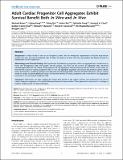Adult Cardiac Progenitor Cell Aggregates Exhibit Survival Benefit Both In Vitro and In Vivo
Author(s)
Bauer, Michael; Kang, Lifeng; Qiu, Yiling; Peng, Michelle; Chen, Howard H.; Camci-Unal, Gulden; Bayomy, Ahmad F.; Sosnovik, David E.; Khademhosseini, Ali; Liao, Ronglih; ... Show more Show less
DownloadBauer-2012-Adult Cardiac Progen.pdf (832.0Kb)
PUBLISHER_CC
Publisher with Creative Commons License
Creative Commons Attribution
Terms of use
Metadata
Show full item recordAbstract
Background: A major hurdle in the use of exogenous stems cells for therapeutic regeneration of injured myocardium remains the poor survival of implanted cells. To date, the delivery of stem cells into myocardium has largely focused on implantation of cell suspensions. Methodology and Principal Findings: We hypothesize that delivering progenitor cells in an aggregate form would serve to mimic the endogenous state with proper cell-cell contact, and may aid the survival of implanted cells. Microwell methodologies allow for the culture of homogenous 3D cell aggregates, thereby allowing cell-cell contact. In this study, we find that the culture of cardiac progenitor cells in a 3D cell aggregate augments cell survival and protects against cellular toxins and stressors, including hydrogen peroxide and anoxia/reoxygenation induced cell death. Moreover, using a murine model of cardiac ischemia-reperfusion injury, we find that delivery of cardiac progenitor cells in the form of 3D aggregates improved in vivo survival of implanted cells. Conclusion: Collectively, our data support the notion that growth in 3D cellular systems and maintenance of cell-cell contact improves exogenous cell survival following delivery into myocardium. These approaches may serve as a strategy to improve cardiovascular cell-based therapies.
Date issued
2012-11Department
Harvard University--MIT Division of Health Sciences and TechnologyJournal
PLoS ONE
Publisher
Public Library of Science
Citation
Bauer, Michael et al. “Adult Cardiac Progenitor Cell Aggregates Exhibit Survival Benefit Both In Vitro and In Vivo.” Ed. Loren E. Wold. PLoS ONE 7.11 (2012).
Version: Final published version
ISSN
1932-6203